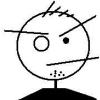Imagine Homeward Bound: The Incredible Journey as directed by Sam Peckinpah and co-scripted by William Gibson and the Animal Liberation Front and you'd have a decent, if incomplete, idea of the premise behind Grant Morrison and Frank Quitely's 2004 mini-series We3. I say "incomplete" because underneath the high concept sci-fi ultraviolence, We3's tale of three cybernetically-augmented animals on the run from a black-ops weapons lab possesses a level of genuine pathos rarely encountered in a work of fiction, and especially within the medium of comics.
While I'm well acquainted with the technical concept of catharsis (as is anyone who has ever taken a college literature or drama class), it isn't often that I come across a work that inspires the actual emotional purgative-tranformative process. This is partly because I'm a jaded old fart, but also because I'm hyper-sensitive to attempts to stack the creative deck in order to force such emotional responses. Art is manipulative by nature, but too many artists get too eager and overplay their hands to dismal effect. Reading We3 is a cathartic experience for me, an emotional roller coaster ride that leaves me feeling undefinably but noticeably changed (and a bit teary-eyed) afterward. (Granted, stories with animal protagonists have a paw up in the "pull the heartstrings" stakes, but Morrison's characterizations and Quitely's illustrations of "1" the dog, "2" the cat, and "3" the rabbit ring so authentic it hurts me to read the more tragic parts of the story.)
Today marks the release of Grant Morrison's most current effort, Final Crisis #1, a big "event" title guaranteed to change the DC superhero universe forever (again, but for real this time, honest). I've read it, and it's decent enough for what it is, but there's already a vocal minority in the dark corners of the comics internet reiterating the usual charge lobbed at Morrison's work, namely that his stuff is "too hard to follow."
Morrison's stuff tends to be hit or miss with me, and I do think his infatuation with BIG CRAZY CONCEPTS tends to work at cross-purposes with his plot logic at times, but I never really considered his work to be incomprehensible (apart from the instances Morrison was deliberately attempting to be obtuse). Final Crisis, in comparison with some of Morrison's other work (The Invisibles or even parts of Seven Soldiers), is a model of narrative lucidity.
The real problem, I suspect, lies with the audience, who've been conditioned to see comics, especially superheroic stuff, as product to be consumed rather than material to be engaged. There's a thin line between a "challenging" work and self-indulgent wankery, but requiring more effort than a five-minute linear burn-through to grasp the material does not automatically place a work in the latter category. Junk food should not set the baseline for one's palate, and a genre shouldn't be held hostage by some lazy, retrograde bottom feeders.
Upon considering the fannish whinings, as well as Morrison's own remarks that fans who don't like the content ought to pencil in their own captions in the word balloons, I went up to the attic and dug out my old Creator-to-Creator translation machine. It's a heavily-modified version of Joel Robinson's Cartuner (here at the 4:00 mark) incorporating Babelfish source code which allows one to see how certain comics would have turned out if done by a different creator (like EC horror stories as done by Carl Barks, for example).
And so, in the name of SCIENCE, I took the following panel featuring 1 the dog and 2 the cat from the second issue of We3....
...and ran it through the machine to see how it theoretically could have been "improved" by other fan-favorite comic book writers.
The panel in question, as it would have been written by:



...and just so the indie kids don't feel left out:

I really wanted to try and generate a Chris Claremont one, but the machine's feed kept getting jammed on "focused totality," "starhair," and "violated my soul." The technology has its limits, apparently.
David Walker - Ring the Changes (from Le Beat Bespoke, 2004) - A harmonious marriage of powerhouse pop (a la Sir Tom Jones) and heavy, horny funk.
Quincy - Turn the Other Way Around (from Quincy, 1980) - Man, that Jack Klugman really rocks! (I kid. They were a New York-based power pop band that got some brief national exposure following the success of The Knack.)
Isabel Bond - Let's Find Out (from Beat at Cinecitta, Vol. 3, 1994) - This weird slice of freakbeat soul comes from the soundtrack of 1969 Italian sex comedy Vedo Nudo. My Italian is rusty, but I believe the title of the film translates into English as "broad pantomime and boob shots."
*In an actual Bendis comic, the text in that scene would have been frugally doled out across a nine-panel grid covering an entire page. The translation machine still needs some fine-tuning.



























